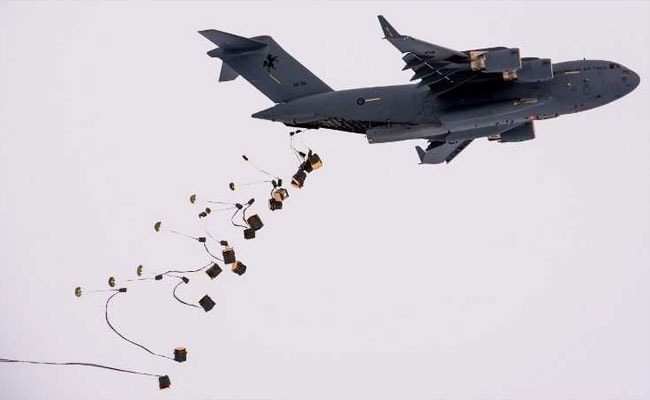
After a mid-air refuelling the Australian Antarctic station recieved food drop from a plane. (AFP)
Sydney, Australia:
Researchers at a remote Australian Antarctic station have received their first-ever food drop from a plane Yesterday after a successful maiden mid-air refuelling over the icy region. The new delivery mode means cargo can be parachuted year-round to scientists. Previously they had to wait up to two weeks for supplies to be shipped in by sea, and ships only operate between October and April. A Royal Australian Air Force C-17A Globemaster III was topped up yesterday by a tanker aircraft 22,000 feet above the Southern Ocean, around halfway through its 10,000 kilometre (6,213 mile) round trip from an airbase near Melbourne to the isolated Davis station and back.
"The airdrop included fresh food, medical supplies and mail for the 17 expeditioners who have spent the past six months wintering at the station," Australian Antarctic Division official Matt Filipowski said.
"It's hoped, in the future, this capability will allow us to pre-position equipment and supplies for station and science projects before the shipping season starts, so it's all ready to go when the first summer expeditioners arrive," he added.
Some 15 pallets weighing 700 kilograms (1,543 pounds) were dropped in the trial run, with plans to use the method to keep Australia's three Antarctic stations well-stocked throughout the year.
 The country also has one sub-Antarctic station, with all four manned year-round for projects including research into wildlife and climate change.
The country also has one sub-Antarctic station, with all four manned year-round for projects including research into wildlife and climate change.
"Conditions on the ground were ideal for the airdrop; it was overcast, minus 18 degrees and light winds," Davis station leader Kirsten le Mar said.
"We're now enjoying fresh carrots, lemons and potatoes and reading letters from home."
Several countries have territorial claims on Antarctica -- viewed as a potential future source of huge mineral resources -- although under a 1949 agreement the frozen continent is designated a scientific preserve.
About 30 nations operate permanent research stations on the continent.
(Except for the headline, this story has not been edited by NDTV staff and is published from a syndicated feed.)
"The airdrop included fresh food, medical supplies and mail for the 17 expeditioners who have spent the past six months wintering at the station," Australian Antarctic Division official Matt Filipowski said.
"It's hoped, in the future, this capability will allow us to pre-position equipment and supplies for station and science projects before the shipping season starts, so it's all ready to go when the first summer expeditioners arrive," he added.
Some 15 pallets weighing 700 kilograms (1,543 pounds) were dropped in the trial run, with plans to use the method to keep Australia's three Antarctic stations well-stocked throughout the year.

The airdrop included fresh food, medical supplies and mail for the 17 expeditioners in Antarctica (AFP)
"Conditions on the ground were ideal for the airdrop; it was overcast, minus 18 degrees and light winds," Davis station leader Kirsten le Mar said.
"We're now enjoying fresh carrots, lemons and potatoes and reading letters from home."
Several countries have territorial claims on Antarctica -- viewed as a potential future source of huge mineral resources -- although under a 1949 agreement the frozen continent is designated a scientific preserve.
About 30 nations operate permanent research stations on the continent.
(Except for the headline, this story has not been edited by NDTV staff and is published from a syndicated feed.)
Track Latest News Live on NDTV.com and get news updates from India and around the world

